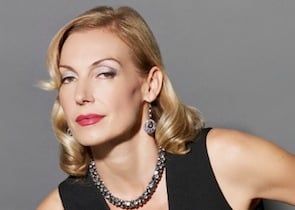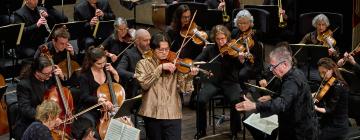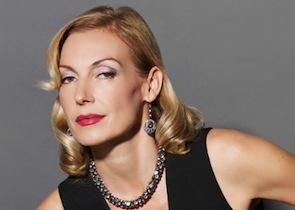
Chanteuse Ute Lemper truly stands alone in the musical world. Although best known for her interpretations of the songs of the Weimar Republic, she’s an avid explorer of all types of music, as well as a musical theater fixture, a dancer, and an artist. She returns to San Francisco at the end of March with the Volger Quartet, Stefan Malzew, and a program that explores the music of the 1930s, from Berlin to Argentina, with a bit of a classical twist. As with all her programs, it promises to be an evening unlike any other.
It’s good to welcome you back to San Francisco.
It’s about time I got back! It’s been maybe four years?
The concert will feature the songs on your latest recording, Paris Days, Berlin Nights, right?
Yes. We just recorded this two weeks ago. And the recording only happened because of the tour. There are these new arrangements by Stefan Malzew that are more classical — contemporary classical arrangements. There are Hanns Eisler songs, serious and a little political, written in Germany, in the last efforts when the Nazis were crushing Germany. It’s called, I believe, Cabaret in Exile, and they were only performed in Sweden and Switzerland. They are, in English, “The Trench,” “Suicide,” and “The Waterwheel.” The poetry in them is fantastic and the music is beautiful. We then move to songs in Yiddish; they’re songs of hope, love, and a place of peace. There’s a Russian song of war and love and finding a place of justice; it’s serious and heartfelt. We then move to songs by Jacques Brel and Edith Piaf and [Astor] Piazzolla.
To get an overview of the program, it’s really good to look at our trailer.
We had only two days of rehearsal, and the tour in front of us, before recording. We really rehearsed! That was magical, but hard work. We worked 16 to 17 hours a day, until three in the morning, in a little church in Neubrandenburg, Germany. We did one general rehearsal for the public. It was great, though there were a couple of accidents.
We then did a classical way of recording: all together on a small concert stage, with standup microphones. None of this dropping-in that you do today.
Featured Video
Ute Lemper - "La Vie En Rose" & "Non, Je Ne Regrette Rien" (1992 live)
Related Article
Sins, Swans, and Dons in Santa Rosa
May 10, 2010
The music reflects all the different chapters in my life. The alternative rock was one time in my life. I didn’t find it totally satisfied; it was not transparent and it was too loud and too crashy. I did like the two Tom Waits songs. It did inspire me to write my own songs, which are much more contemporary.
So what draws you to a piece of music?
My artistic roots are always the Weimar Republic repertoire. There’s a little bit of Berlin in everything I do. I lived in Paris and love the chanson style, the poetry in the music; it’s just so special and one of the most beautiful things on Earth. Being so much in South America, I was drawn into the Argentine tango world. Last year, I did concerts with these kids. It was an unbelievable collaboration. No one can play tango like they do. I have tango songs in this upcoming concert, but they’re “classical-fied.” Really, the universes come to me.
You graduated from a dance academy, but you also went into musical theater and acting. Was there one particular field you always thought you would embrace when you were studying, such as dance, or were you always hoping or planning to be able to do such a broad range of work?
I did ballet, but the main schooling I did was drama school in Vienna. I never wanted to just be a dancer. I was more interested in the word and the singing. Dancing was a part of that, and helpful, but I wanted the storytelling.
Storytelling seems to be a theme in your professional life.
It comes down to the word. Sometimes, in music, the word just appears. My mission is to connect the word to the audience as directly as possible, with the instrumental supplementing that. It can be difficult.
When were you first drawn into performing, and how did that develop?
I had a normal childhood. I started ballet for fun when I was young. As a teenager, I became interested in piano and singing in a jazz band. I was in the larger band, plus there was a rock band there. It wasn’t clear, even into drama school, what I wanted. Then one job followed the other really quickly. I didn’t have those crazy student years. I had 1½ years of drama school and I’m a professional! It was a high-pressure youth. I was not going out to bars and getting crazy with friends. I’m almost 50 and still waiting for that.
Maybe something to look forward to in the future?
My mission is to connect the word to the audience as directly as possible.
It’s not as easy now. It’s hard enough dealing with jet lag.
Especially with four children, including a baby.
Yes, though he’s the easiest of all four. When he was six weeks old, I took him on a three-week tour to Germany, but I had my mother to help. Now, it’s better for him to be home with people who love him, and his routine. The separation is not easy, but I can digest it better now than with the others.
You live in New York City, which seems like a perfect match for you. Do you love it? Any other places you might be drawn to for living?
I love New York. I have a little rooftop terrace in Manhattan, with trees. We’re in a neighborhood of brownstones, prewar apartments. I can see Central Park, midtown Manhattan, the river. It’s beautiful here today, 60 degrees and blue skies.
In New York I can escape the pressure of the city. I can relax. It’s a residential area; everything is within walking distance: schools, after-school activities, music, ballet class, sports, whatever [my family] wants. Shopping is right here. It’s a little village. And the Upper West Side is so open; there is no clear national identity. People are from everywhere: Europe, Asia, South America. I did not experience that freedom in other cities I’ve lived in.
But I’m still European. I’d love to have one leg in Europe — Barcelona or Berlin, maybe — and one in New York, but that’s not possible with the kids. That’s another chapter of my life.
I can’t imagine not doing what I do now. It keeps me young, fresh, exciting, curious.
What do you do when you do have spare time, which is probably rare?
Between family and business and bookings and creative work, there’s not much free time. I have to set priorities. I don’t go out as much with friends. I stick to home with the family. We have dinners at home.
I am a tennis nut. I love it so much. It’s fun and exhausting. I like movies, walks, biking on the bike path, swimming, but I don’t really have hobbies.
If you hadn’t gone into the performing arts, what do you think you would be doing?
I can’t imagine not doing what I do now. It keeps me young, fresh, exciting, curious. It’s so nourishing. I do what I love. But when I was younger, I could imagine doing something with languages, culture, and literature, going to university and being a teacher, or writing. Nothing mathematical. In the beginning years, which were full of pressure, I would think, I just want a normal life.
What music are you listening to now?
Right now, I’m studying this concert music to perform without accidents. I have to know everything by heart. The musicians have music in front of them.
I listen to a big array of music. I love jazz — Miles Davis, Brazilian jazz. I’ve been listening to Brad Meldhau, a great jazz musician, and Anne Sophie von Otter, a classical musician, and their collaboration, Love Songs. She becomes more a chanson and he more classical. I don’t surf the Internet much, but I went on iTunes and this appeared. That’s so amazing, how they do that. I love anything from Stravinsky to Debussy to Mahler, contemporary classics, Copeland, Barber.
My husband and I will go out late at night to jazz clubs and have a glass of wine and listen to live music. It doesn’t happen often enough, though.

